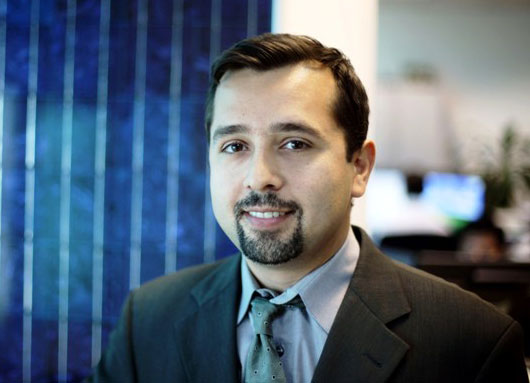Middle East can become major exporter of renewable energy.
 Other News
Other News Subscribe to newsletter
Subscribe to newsletter
| 8 Jan 2012 |

Vahid Fotuhi, Chairman of the Emirates Solar Industry Association.
While the world continues to look at renewable energy as an alternative option to power their economies, one solar energy expert is confident that the Middle East can be a major exporter of the infinite resource in the future.
Vahid Fotuhi, Chairman of the Emirates Solar Industry Association said that with an abundance of year-round sunlight, as well as pockets of geothermal activity, the potential for renewable energy in the Middle East is vast.
“We have all the ingredients we need to make renewable energy a success in the Middle East,” said Fotuhi. “Saudi Arabia’s Rub Al’Khali region (the Empty Quarters) receives enough sunlight to power two earths. We just need to find an efficient and commercially viable way of harnessing that energy. I’m confident that it’s not a question of ‘if’ but rather ‘when’”.
Fotuhi will be part of an expert panel discussing the growth of renewable energy in the Middle East at the Middle East Electricity’s Power & Utilities Infrastructure Conference, taking place at the Dubai International Convention and Exhibition Centre from 8 to 9 February, 2012.
According to the United Nations Environment Programme, new investment in renewable energy for the Middle East and Africa region in 2010 grew 104 per cent to reach US$5 billion. Fotuhi said that though the potential for renewable energy in the Middle East is clear, the key challenges are the high costs and the lack of legislation that’s needed to tap that potential.
“There are two factors that need to be put in place for renewable energy to truly take off,” added Fotuhi. “First, there needs to be rules and regulations governing the implementation of renewable projects, and secondly, governments need to provide support in the form of ‘green subsidies’ to help the industry get on its feet.”
Fotuhi stated that investment in research and development in the renewable energy sector will help drive down costs as well as improve profits for investors. He continued: “We have seen the price of solar and wind systems drop by over 50 per cent over the past few years, while the cost of conventional electricity has gone up.
“This means that renewables are becoming increasingly competitive and attractive for investors. From a job creation point of view, research shows that for every one megawatt of solar energy, 15 jobs would be created across the entire value chain.”
The Power & Utilities Infrastructure Conference is a new feature of Middle East Electricity 2012, the world’s leading power event that focuses on power, lighting, renewable, nuclear and water sectors, taking place from 7 to 9 February, 2012. The exhibition boasts of over 1000 exhibitors from 59 countries. Nearly ten per cent of these exhibitors will be showcasing products and services in the new and renewable energy sector.
Another new addition to the event is the Smart Power 2012 conference, which will discuss the development and future of smart energy policies.




